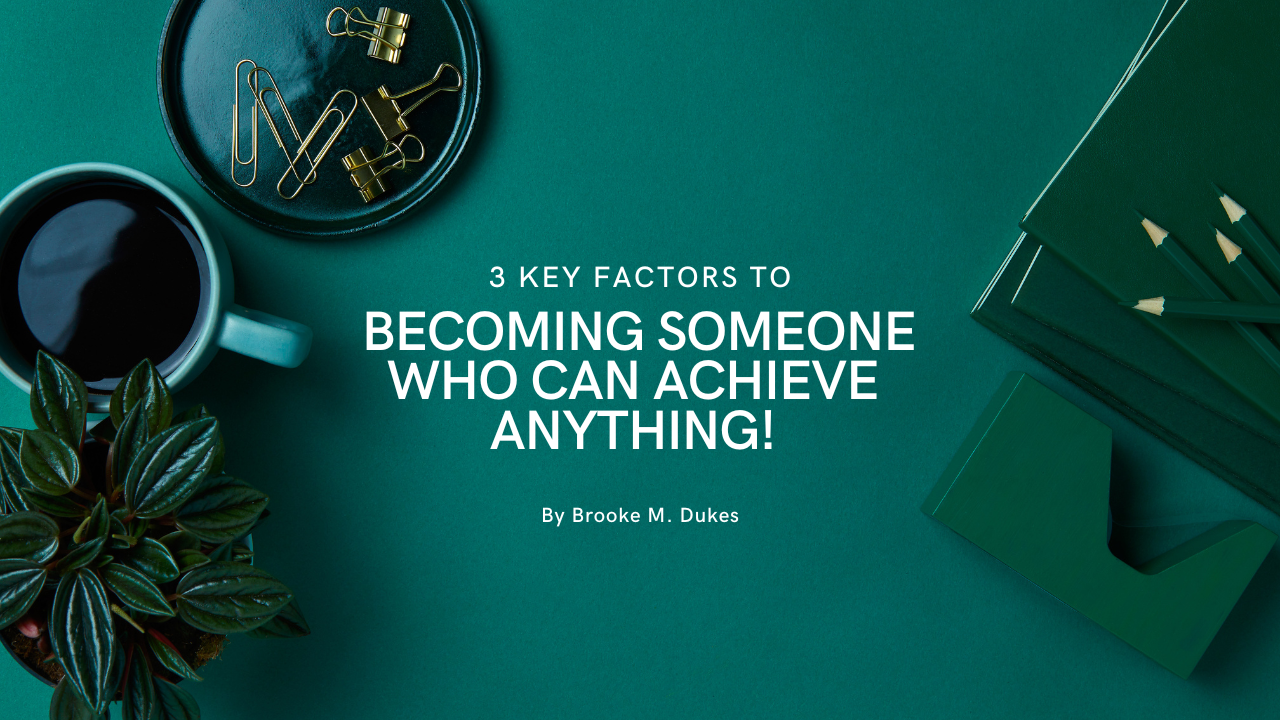Becoming Someone Who Can Achieve Anything!
Sep 27, 2023
By: Brooke M. Dukes
The Factors
When people ask you who you are, it’s common to reply with statements such as “I am a mother.” “I am a leader.” “I am successful.” Any time you use the words “I am,” you are defining your identity through your beliefs. But where do these statements come from?
Your identity is shaped directly by your beliefs, which are formed through the choices you make through unconscious behaviors, patterns, and consistent habits. Anyone can make short-term changes to their identity by making new decisions or setting new goals, but sustaining those changes over time requires a lot of intentional cognitive effort and willpower. Probably the best example of making an identity change is making a New Year’s resolution. We’ve all done it — made a pact with ourselves to lose that stubborn ten pounds by eating healthier and buying a new gym membership. All seems to be going according to plan for a week, maybe two if you’re lucky, and before you know it, you’re pulling into McDonald’s drive-thru as if your car was steering itself! How’d that happen?
Falling back into old identity habits doesn’t mean you’re weak or incapable; it simply means you’re human. The strongest force in human nature is to stay consistent with the identity you hold of yourself — even if that identity is standing in the way of your success. You might be asking, “If we are constantly changing, then why is the strongest force of human nature to stay consistent with our identity?” The answer boils down to three key factors: your significant emotional events, your environment, and your conditioning, and if you want to experience a change to your identity for the long term, you’ll have to examine each of them closely. So, let’s dive in.
- Significant emotional events are situations or experiences that evoke intense emotions that you then attach a certain meaning to, which in some way, alters the way you perceive yourself, others, or the world. Significant emotional events can be welcomed and intentional, such as getting married, getting a divorce, jumping out of a plane, moving to a new home, or getting a new job. Many significant emotional events, like a global pandemic, losing a position at work, or experiencing a heart attack cause you to be reactive and tend to be life's way of telling you it’s time to make a change. These events can impact your life and identity even if you didn't consciously see it coming. The most important part of any significant emotional event is how you define the experience and what you choose to focus on about it. Two people can go through the same situation and have a completely different reaction to the same event. One may be forever disgruntled about the situation and the other forever grateful, and they will both attribute their successes and failures to the same moment or experience. It’s all in what you make something mean. So, the first way to change your identity is to create new significant emotional events in your life. You can consciously choose to have brand-new experiences and direct your focus in a positive way that reinforces who you want to become. Want to go from being a lazy couch potato to an avid gym rat? Start associating a new emotional experience to healthy food and a consistent exercise routine and watch what happens.
- Your environment plays a significant role in shaping your identity, from where you live and work to the people you surround yourself with. The people you spend time with are either influencing you or you are influencing them. We model people around us and are influenced by them in ways that are mostly unconscious and outside of our awareness. When you are growing and developing new habits, it’s important to consider how the elements that make up your environment may be influencing you and impacting your life. If you don’t like an aspect of your life, take a look around and ask yourself how you can shake things up a bit.
- Conditioning is the act of doing the same thing over and over until it becomes part of your unconscious habits and identity. In psychological terms, conditioning can happen consciously or unconsciously; it can also happen intentionally or unintentionally. Conditioning teaches you about the world and how it works, about themselves and their roles and abilities, and about anything else that matters. When paired with reinforcement, rewards, and punishments, conditioning is a very powerful tool for learning, habit change, behavior modification, and achievement. Commitment and consistency are two fundamental components that impact your results, no matter what you’re trying to change. If you’re not getting the results you want, examine your conditioning. Are you taking enough consistent action to build new habits or are your habits a little too “sometimey”?
You have 30 trillion human cells in your body, with about 330 billion of them being replaced every single day. You also have 100 billion brain cells! That means you have an infinite capability to grow and expand in ways you never thought were possible. Changing your identity isn’t easy, but by creating new significant emotional events, changing your environment, and doubling down on your conditioning, you can become someone who can achieve anything!
Stay connected with news and updates!
Don't miss our weekly newsletter for insightful tips, helpful resources, informative and entertaining blogs and podcasts! Don't worry, your information will not be shared.
We hate SPAM. We will never sell your information, for any reason.


